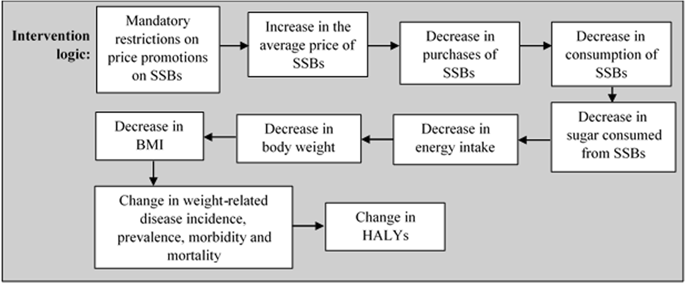当前位置:
X-MOL 学术
›
Int. J. Obesity
›
论文详情
Our official English website, www.x-mol.net, welcomes your
feedback! (Note: you will need to create a separate account there.)
The potential cost-effectiveness of mandatory restrictions on price promotions for sugar-sweetened beverages in Australia.
International Journal of Obesity ( IF 4.2 ) Pub Date : 2019-12-02 , DOI: 10.1038/s41366-019-0495-9 Oliver Huse 1 , Jaithri Ananthapavan 1, 2 , Gary Sacks 1 , Adrian J Cameron 1 , Christina Zorbas 1 , Anna Peeters 1 , Marj Moodie 1, 2 , Jane Martin 3 , Kathryn Backholer 1
International Journal of Obesity ( IF 4.2 ) Pub Date : 2019-12-02 , DOI: 10.1038/s41366-019-0495-9 Oliver Huse 1 , Jaithri Ananthapavan 1, 2 , Gary Sacks 1 , Adrian J Cameron 1 , Christina Zorbas 1 , Anna Peeters 1 , Marj Moodie 1, 2 , Jane Martin 3 , Kathryn Backholer 1
Affiliation

|
BACKGROUND
Restricting price promotions on unhealthy foods and beverages has been identified by governments as a promising approach for improving population diets. Using a limited societal perspective, this study assessed the potential cost-effectiveness of mandatory restrictions on price promotions for sugar-sweetened beverages (SSBs) in Australia.
METHODS
Australian dietary consumption data, together with UK data on the SSB sales uplift associated with price promotions, were used to estimate reductions in SSB purchases and consequent changes in body mass index following the intervention. A multi-state, multiple-cohort Markov model was used to estimate the obesity-related health and cost impacts over the lifetime of the 2010 Australian population. Costs included passing legislation, assisting retailer implementation, and compliance monitoring.
RESULTS
The intervention was estimated to result in a mean change in daily energy intake of -12.52 kJ (95% Uncertainty Interval, UI: -15.91 to -9.58) per person, which translated to a mean body weight change of -0.11 kg (95%UI: -0.14 to -0.08) per person. Total Health Adjusted Life Years gained were estimated at 34,260 (95%UI: 24,922-45,504). Estimated costs were AUD17.0 million, with estimated healthcare cost savings of AUD376.0 million. The intervention was considered dominant (cost-saving and health promoting). The intervention remained cost-effective if retailers reduced average non-discounted SSB prices in response to the intervention by less than 5.36%.
CONCLUSIONS
Restricting price promotions on SSBs is likely to be highly cost-effective, although its impact would depend on how industry and shoppers respond. Although Australian data are used, these results are likely to be transferable and highly relevant to the UK context. Policies for restricting price promotions should be considered as part of a comprehensive obesity prevention strategy.
中文翻译:

澳大利亚对含糖饮料的价格促销进行强制性限制的潜在成本效益。
背景技术限制对不健康食品和饮料的价格促销已被政府确定为改善人口饮食的有前途的方法。本研究使用有限的社会视角,评估了澳大利亚对含糖饮料 (SSB) 价格促销进行强制性限制的潜在成本效益。方法 澳大利亚饮食消费数据,连同英国有关与价格促销相关的 SSB 销售提升的数据,被用来估计干预后 SSB 购买量的减少和随之而来的体重指数的变化。使用多州、多队列马尔可夫模型来估计 2010 年澳大利亚人口一生中与肥胖相关的健康和成本影响。成本包括通过立法、协助零售商实施和合规性监控。结果 据估计,干预导致每人每日能量摄入的平均变化为 -12.52 kJ(95% 不确定性区间,UI:-15.91 至 -9.58),这意味着平均体重变化为 -0.11 kg(95 %UI:-0.14 到 -0.08) 每人。获得的总健康调整生命年估计为 34,260(95%UI:24,922-45,504)。估计成本为 1,700 万澳元,估计节省的医疗保健成本为 3.76 亿澳元。干预被认为是主要的(节省成本和促进健康)。如果零售商针对干预措施将平均非折扣 SSB 价格降低不到 5.36%,则干预措施仍然具有成本效益。结论 限制 SSB 的价格促销可能具有很高的成本效益,尽管其影响将取决于行业和购物者的反应。尽管使用了澳大利亚的数据,但这些结果很可能是可转移的,并且与英国的情况高度相关。限制价格促销的政策应被视为肥胖预防综合战略的一部分。
更新日期:2019-12-02
中文翻译:

澳大利亚对含糖饮料的价格促销进行强制性限制的潜在成本效益。
背景技术限制对不健康食品和饮料的价格促销已被政府确定为改善人口饮食的有前途的方法。本研究使用有限的社会视角,评估了澳大利亚对含糖饮料 (SSB) 价格促销进行强制性限制的潜在成本效益。方法 澳大利亚饮食消费数据,连同英国有关与价格促销相关的 SSB 销售提升的数据,被用来估计干预后 SSB 购买量的减少和随之而来的体重指数的变化。使用多州、多队列马尔可夫模型来估计 2010 年澳大利亚人口一生中与肥胖相关的健康和成本影响。成本包括通过立法、协助零售商实施和合规性监控。结果 据估计,干预导致每人每日能量摄入的平均变化为 -12.52 kJ(95% 不确定性区间,UI:-15.91 至 -9.58),这意味着平均体重变化为 -0.11 kg(95 %UI:-0.14 到 -0.08) 每人。获得的总健康调整生命年估计为 34,260(95%UI:24,922-45,504)。估计成本为 1,700 万澳元,估计节省的医疗保健成本为 3.76 亿澳元。干预被认为是主要的(节省成本和促进健康)。如果零售商针对干预措施将平均非折扣 SSB 价格降低不到 5.36%,则干预措施仍然具有成本效益。结论 限制 SSB 的价格促销可能具有很高的成本效益,尽管其影响将取决于行业和购物者的反应。尽管使用了澳大利亚的数据,但这些结果很可能是可转移的,并且与英国的情况高度相关。限制价格促销的政策应被视为肥胖预防综合战略的一部分。









































 京公网安备 11010802027423号
京公网安备 11010802027423号